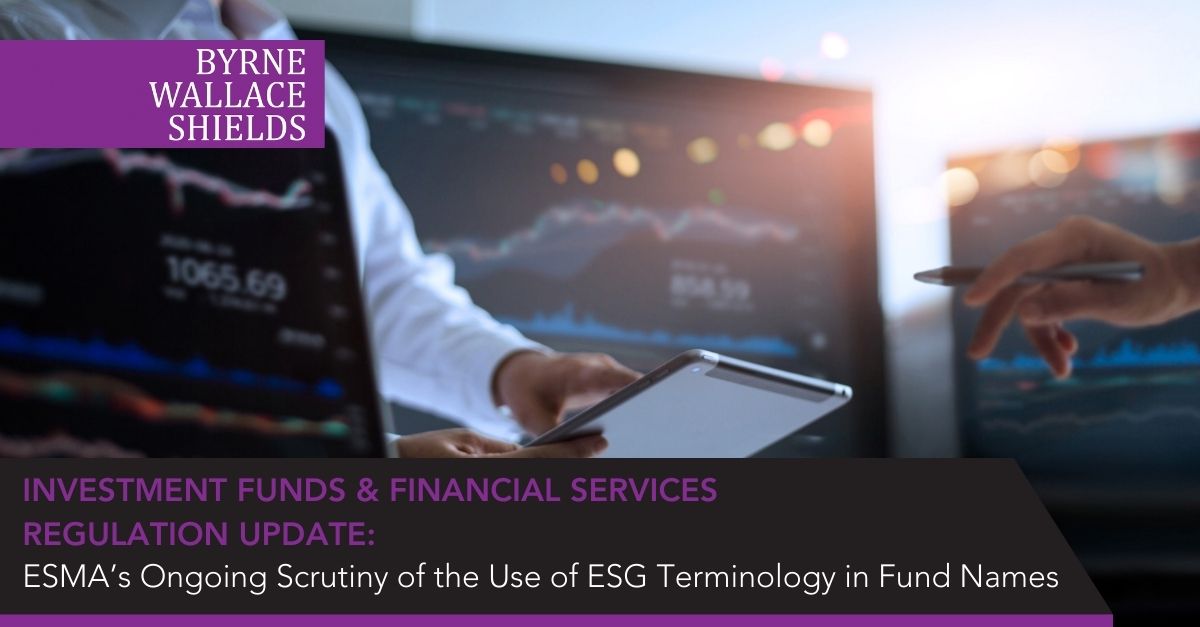ESMA’s Ongoing Scrutiny of the Use of ESG Terminology in Fund Names
Monday, 28 April 2025
When environmental, social, governance or sustainability-related (ESG) words and phrases are used in or added to the name of a fund – what is the impact?
ESMA continues to focus on combatting greenwashing in investment funds and recently published Fund names: ESG-related changes and their impact on investment flows (ESMA TRV Risk Analysis, 10 April 2025).
The analysis confirms that the inclusion of ESG terms in fund names continues to increase and can lead to a considerable increase in subscriptions. Fund managers must ensure that the composition of their ESG fund portfolios aligns with their ESG fund names and avoid the use of unfair, unclear or misleading ESG terms.
Background
ESMA previously conducted a number of studies and published articles relating to the use of ESG terms by investment funds and highlighted the need for guidelines to ensure that ESG fund names accurately reflect fund portfolios – please see our previous article here.
In August 2024, it proceeded to publish Guidelines on funds’ names using ESG or sustainability-related terms, which set out recommendations to fund managers on the use of certain ESG terms (including the investment thresholds to be met). ESMA indicated that the name of a fund is a means of communicating information about the fund to investors and is also an important marketing tool for the fund - a fund’s name is often the first piece of fund information investors see and can have a significant impact on their investment decisions.
This latest analysis builds on this and further explores the impact of the use of ESG terms in fund names on investor inflows, as detailed further below.
Findings of Risk Analysis: ESG-related changes and their impact on investment flows
As many investors use fund names as a crucial initial tool to sift through the investment universe, it follows that misaligned names can be misleading for investors. This is also known as greenwashing when it relates to ESG.
For example, ESMA studies have shown that related portfolio adjustments do not always accompany ESG name changes, although a 2023 Gibbon et al. study suggests that, following ESG name changes, managers are increasingly improving ESG performance and reducing exposure to controversial businesses.
While the introduction of the Sustainable Finance Disclosure Regulation, and concerns around greenwashing, may have somewhat flattened the use of ESG terms in EU fund names, ESMA’s analysis found that there has nonetheless been a considerable increase (from 3% before 2015 to around 9% in mid-2024) and that advertising an ESG stance significantly boosts fund inflows.
It should also be noted that the rotation of investor portfolios towards ESG funds may have reached its peak in the short term, noting that the most explosive growth preceded mid-2021 and, from mid-2022, a small but increasing number of funds are removing ESG words from their names. Another cohort of funds is replacing ESG terms with other ESG terms.
Analysis of Categories of ESG Terms Used
In reaching its conclusions, ESMA broke down the terms used into specific ESG components, words that are:
1. social or governance related
2. environmental or impact related
3. sustainability related
While all three categories are increasingly used in EU-domiciled investment fund names, the use of environmental-related words emerged as the dominant category. Boosted fund inflows are primarily seen in funds that use an environmental-related term. Impacts in funds using social, governance and sustainability related terms are largely insignificant. Indeed, a slight recent decline was seen in the use of sustainability related terms, perhaps due to the evolving meaning of “sustainable”.
Analysis of Specific ESG Terms Used
Examination of specific ESG-related terms revealed no widely recognised set of terms and the emergence of more standardised terminology. An increase can be seen in the use of “ESG” itself and continued use of “sustainable” and “SRI”, despite a recent slight decrease. Terms such as “transition”, “impact” and “climate” have recently gained considerable traction.
Duration of Impacts
A significant boost to fund flows was evident during the first five quarters following a name change (being most evident in the initial two quarters).
Conclusion
ESMA concluded that funds are, on balance, increasingly incorporating ESG terms into their names, with a preference for environmental-related words, resulting in boosted fund inflows (cumulatively an 8.9% increase in the first year driven by funds using environmental terms, rather than social or governance terms).
As such, boosted inflows present fund managers with significant financial incentives to use ESG terms in fund names. ESMA cautions that fund managers should align portfolios with ESG fund names and investor preferences, in compliance with ESMA Guidelines, to support the continued transition to a more sustainable economy.
How Can We Help
If you require our assistance in ensuring compliance with ESMA’s guidance around the use of ESG or sustainability-related terms in fund names; or with establishing an ESG fund, please contact David Naughton or Katrina Smyth in the Byrne Wallace Shields Investment Funds and Financial Services Regulation team.

